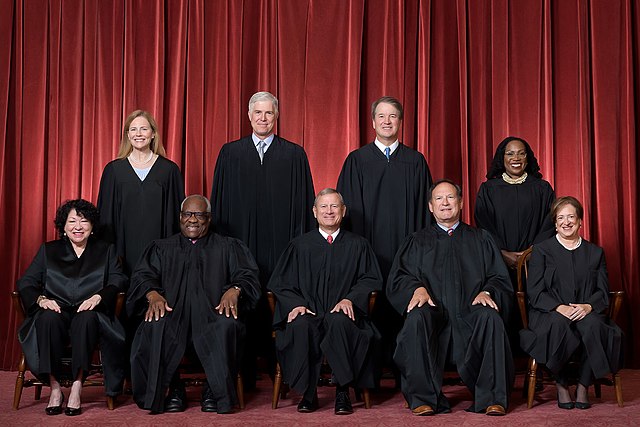SCOTUS throws out college affirmative action admissions

The Washington Examiner is reporting:
"Harvard’s and UNC’s admissions programs violate the Equal Protection Clause of the Fourteenth Amendment," the majority held in Students for Fair Admissions v. President and Fellows of Harvard College.
Liberal Justice Sonia Sotomayor dissented and was joined by Justice Elena Kagan. Justice Ketanji Brown Jackson dissented in the UNC case, joined by Sotomayor and Kagan. Jackson recused herself from the Harvard case due to her past service on the university board.
Sotomayor chastised the majority's opinion, saying it "stands in the way and rolls back decades of precedent and momentous progress."
"It holds that race can no longer be used in a limited way in college admissions to achieve such critical benefits. In so holding, the Court cements a superficial rule of colorblindness as a constitutional principle in an endemically segregated society where race has always mattered and continues to matter," Sotomayor added.
Justices have been mulling since November over two cases brought by the nonprofit group Students for Fair Admissions, headed by conservative legal strategist Edward Blum, a staunch critic of affirmative action policies.
Meanwhile, the present 6-3 Republican-appointed majority on the court has been inching for years toward an eventual decision against affirmative action. Roberts has been one of the most eager members of the court against such policies, writing in the 2007 Parents Involved case: "The way to stop discrimination on the basis of race is to stop discriminating on the basis of race."
Toward the end of the opinion, the majority sought to placate the woes of the liberal minority dissent.
The majority held that "nothing in this opinion should be construed as prohibiting universities from considering an applicant's discussion of how race affected his or her life, be it through discrimination, inspiration, or otherwise. But, despite the dissent's assertion to the contrary, universities may not simply establish through application essays or other means the regime we hold unlawful today."
Justice Clarence Thomas added that he would "highly doubt" universities could carry on with considering race in admissions policies with the new test that was established Thursday.
“In the future, universities wishing to discriminate based on race in admissions must articulate and justify a compelling and measurable state interest based on concrete evidence. Given the strictures set out by the Court, I highly doubt any will be able to do so."
During oral arguments in October 2022, the court's inclination to ban affirmative action was evident. The court's six conservatives expressed skepticism toward the practice, even as attorneys for Harvard and UNC, along with U.S. Solicitor General Elizabeth Prelogar, implored the court to permit the practice to continue.
A 2014 SFFA case contended that Harvard's admissions policy unlawfully discriminates against Asian American applicants. The university is accused of violating Title VI of the Civil Rights Act of 1964, which bars discrimination based on race, color, or national origin under any program or activity receiving federal funding.
Another case filed in 2014 alleged the University of North Carolina at Chapel Hill unlawfully discriminates against white and Asian American applicants. That suit accused the university of violating the Constitution's 14th Amendment promise of equal protection under the law.
Blum started SFFA in 2014 in part to fight against the affirmative action policies allowed in the Bakke decision. Such policies have long been debated as to whether they might inadvertently discriminate against other applicants. In 2003, the Supreme Court ruled against a University of Michigan system that awarded "points" to minority applicants as going too far but reaffirmed Bakke's central holdings that schools could use race as one of several admission factors.
Banning the use of affirmative action will force elite colleges to reinvent their policies and find new ways to ensure diversity in their student populations without using race as a consideration. Several universities have expressed concerns in legal briefs that a decision to overturn affirmative action could result in fewer minority students on campuses.
But ahead of the high court's opinion release, legal experts speculated colleges might attempt to maintain a superficial vision for diversity on campus without taking race into consideration.
"The Supreme Court ruled that the affirmative action policies at Harvard and the University of North Carolina are violating federal law. Now, we will see whether the universities comply with the Supreme Court's decision or try to resist it," South Texas College of Law Houston professor Josh Blackman told the Washington Examiner on Thursday.
Harvard Law School professor Noah Feldman wrote in October that the eventual decision for the UNC and Harvard cases could be "written so narrowly that it would still be legal for universities to say that they merely hoped to achieve racial diversity. But taking any race-conscious decisions to achieve that goal would be illegal."
The matter of race-neutral admissions policies that are implemented for racially conscious ends could find its way to the Supreme Court soon. A group of parents, alumni, and community members at Thomas Jefferson High School for Science and Technology in Fairfax, Virginia, sued the school for changing its admissions process to increase the number of black and brown students and decrease the number of Asian students.
The U.S. 4th Circuit Court of Appeals ruled that the school's new process did not violate federal law. The case's next stop would be the Supreme Court.
Comments
|
|
Big Bob said:
( July 1st, 2023 @ 8:43 pm )
On a constructive note: all those who think affirmative action is wrong, and I am one of you, join me in asking higher Ed to eliminate affirmative action for white people. End legacy admissions now!
|
|
That support for Dr. King, was that before or after we shot him?
|
|
As usual, Bigot Bob, you unleash your rabid anti-white racism, which is part of your leftist cult. We conservatives believe with Martin Luther King that people should be judged by the content of their character, not the color of their skin.
|
|
Before anyone gets uncomfortable, let me reassure you that one class of people will still be protected regarding admissions to higher education. I know how some of you worry, but rich white people will still have full access. No changes. Such a relief.
|
| Governor Cooper Announces Two Judicial Appointments | Editorials, Beaufort Observer, Op-Ed & Politics | Democrats Devastated As Supreme Court Bans Racism |





















